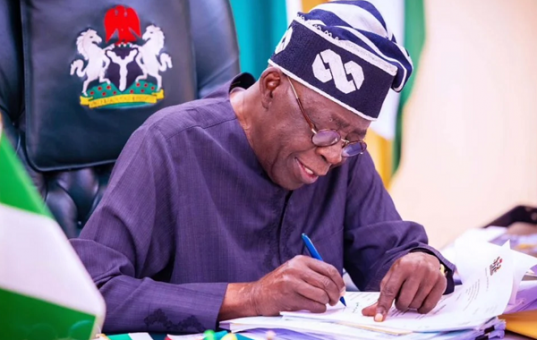
Fifty five of the 175 convicts granted clemency on October 12 have been dropped from a reviewed list approved by President Bola Ahmed Tinubu.
The excluded persons comprise individuals convicted of grievous crimes. Special Adviser on Information and Strategy to the President, Mr Bayo Onanuga, said this via a statement yesterday.
Onanuga added that Tinubu signed the Instruments of Clemency and Pardon, thereby formally exercising his constitutional power of prerogative. He explained that the new list with 120 names was arrived at after consultations with the Council of State and extensive public input.
Already, the reviewed list and signed instruments have been transmitted to the Nigerian Correctional Service for implementation.
Shortly after the announcement, the Attorney-General of the Federation (AGF) and Justice Minister, Lateef Fagbemi (SAN), said with the instruments for the release of the beneficiaries, the presidential prerogative of mercy exercise for the year had come to an end.
The earlier list of 175 had generated public criticism because it included individuals convicted for serious crimes, such as kidnapping, drug and human trafficking, fraud, as well as illegal firearms possession.
The beneficiaries in the new list are grouped into four. Fifteen of them were granted full pardon (including pre-Independence nationalist, Sir Herbert Macaulay; former House of Representatives member, Farouk Lawan, and the Ogoni Nine); four had their death sentences commuted to life imprisonment; 15 were granted clemency, and 86 had their prison terms reduced.
The presidential spokesman said the President’s decision was guided by “the seriousness and security implications of some offences, the need to respect the feelings of victims, to sustain public trust, and uphold Nigeria’s bilateral obligations.”
He added that President Tinubu viewed justice as a “three-way traffic”— balancing the rights of offenders, victims, and society.
Among those whose sentences were reduced under the Instrument of Presidential Prerogative of Mercy (Reduced Terms of Imprisonment and Sentence, 2025) are inmates convicted of manslaughter, culpable homicide, fraud, firearms, and conspiracy offences.
Notable among them is Maryam Sanda (37). She was convicted of culpable homicide and sentenced to death in 2020, but had her sentence commuted to 12 years “on compassionate grounds, in the best interest of her children and for good conduct.”
Others include Yusuf Owolabi (36) and Ifeanyi Eze (33), both serving life sentences for manslaughter, now reduced to 15 years each; Markus Yusuf (41), whose 13-year term was cut to eight years; and Alhaji Abubakar Tanko (61), whose 30-year sentence was reduced to 20.
Under the drug and narcotics category, Patrick Mensah (40) had his 17-year sentence reduced to 13 while others like Obi Chukwu, Tunde Balogun, Lima Diego and Uchegbu Michael received reduced terms of 12 years each.
Dias Christiana (44), a foreign national, convicted of importing cocaine in 2017, had her sentence cut from 15 to 12 years “for remorsefulness and deportation.”
In financial and fraud-related cases, Buka Adamu (40) got his 20-year term reduced to nine, while Mustapha Ahmed, Inibong Nuikidem, Ada Audu, Jonathan Alatoru, and Umannah Ekatte received varying reductions for age, remorsefulness and good conduct.
In firearms-related offences, Abubakar Mamman (38) and Muhammed Bello Musa (35) had their 10-year prison terms cut to seven years, while Nnamdi Anene (67) had his life sentence commuted to 20 years.
Under maritime and conspiracy offences, 10 convicts, including Bright Agbedeyi, Babangida Saliu and Jude Ebaragha, had their 12-year term reduced to eight.
Their fines were waived “based on remorsefulness and impecuniosity.”
For unlawful mining, at least 45 inmates, including Yusuf Alhassan, Abdullahi Isah, Zayanu Bello and Habeeb Suleman at the Medium Security Custodial Centre, Agodi, Oyo State, had their sentences reduced from three to two years.
The President also approved a major structural reform: the relocation of the Secretariat of the Presidential Advisory Committee on Prerogative of Mercy from the Ministry of Special Duties to the Federal Ministry of Justice.
He directed Fagbemi (SAN) to establish new, stricter guidelines for future clemency exercises.
The guidelines must include mandatory consultation with prosecuting agencies to ensure that only deserving individuals benefit from clemency.
According to him, President Tinubu thanked Nigerians for their vigilance and engagement on the issue, reaffirming his administration’s resolve to strengthen the justice system and ensure that the prerogative of mercy “remains a symbol of fairness, not a loophole for impunity.”
*Why earlier list was reviewed, by Fagbemi
Fagbemi said yesterday that with the President’s issuance of instruments granting pardon, clemency, and reduced sentences,” the exercise has come to a close.
He explained that the review of the list was ‘’to ensure that only persons who met stipulated legal and procedural requirements would benefit from the prerogative of mercy.’’
The minister added: “During this final review, a few persons earlier recommended were found not to have met the requirements and were accordingly delisted, while in some other cases, sentences were reviewed and reduced, to reflect fairness, justice, and the spirit of the exercise.”
“This exercise underscores the President’s desire to balance justice with compassion and the belief that justice must not only punish, but also reform and redeem.
“The review was undertaken with meticulous commitment to due process to reinforce the administration’s broader commitment to justice reform and humane correctional practice in line with international standards.’’
Source; The Nation News
